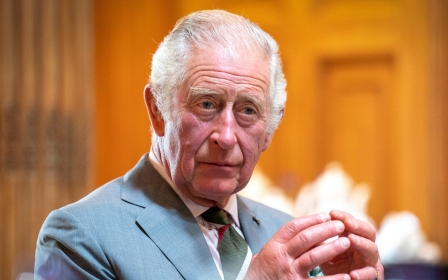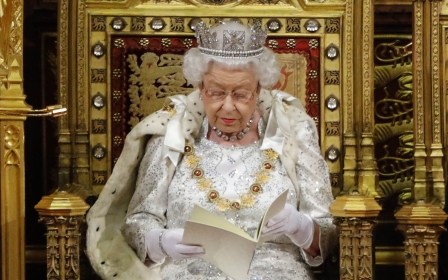No, Queen Elizabeth was not related to the Prophet Muhammad
There is no evidence that Queen Elizabeth II was a descendant of the Prophet Muhammad or his Hashemite clan in the Arabian peninsula, contrary to reports and social media posts that made the claim after the queen's death last week, a historian and a British genealogical publisher told Middle East Eye.
The theory claims that the British monarch's bloodline joins the Prophet's family tree through the 11th century Muslim princess Zaida of Seville, a mysterious figure who lived in Al-Andalus.
The findings, which have been shared by British media outlets since 2018 and resurfaced after the queen's death, were attributed to Burke's Peerage, a British genealogical publisher and an authority on the ancestry of the royal family since 1847.
'Unfortunately, we have no genealogical information relating to this. We were not the original source'
- Burke's Peerage
Newspaper reports quoted Burke's Peerage as the source of the family tree, which connects Queen Elizabeth to the Prophet after a historian wrote an article for a Moroccan news outlet affirming the findings.
However, Burke's Peerage told Middle East Eye in an email that "unfortunately, we have no genealogical information relating to this. We were not the original source, even though that has been incorrectly repeated over the years."
New MEE newsletter: Jerusalem Dispatch
Sign up to get the latest insights and analysis on Israel-Palestine, alongside Turkey Unpacked and other MEE newsletters
The publisher added that Iain Moncreiffe, a British officer and a genealogist, seems to be the source of the claim.
"It would be interesting if historians and researchers could properly investigate the subject," it added.
Hashemites and Thatcher
Currently, there is no official, authoritative, well-sourced finding linking the British monarch to the prophet of Islam.
But despite that, a TV interview with the former mufti of Egypt, Ali Gomaa, reemerged to give credit to the claim.
Gomaa claimed that the British monarch's "grandfather" was a Muslim who was forced to become a Christian "during the Inquisition period", before he arrived in England. Elizabeth's actual grandfather, King George V, ruled between 1910 and 1936.
There is also a press release from October 1986 signed by a group called Moslems in Buckingham Palace and syndicated by United Press International (UPI), quoting a letter allegedly written by Harold Brooks-Baker, the director of publishing at Burke's Peerage, to former prime minister Margaret Thatcher, breaking the news to her about the Queen's Muslim ancestry.
"The royal family's direct descent from the Prophet Muhammad cannot be relied upon to protect the royal family forever from Moslem terrorists," the letter said.
"It is little known by the British people that the blood of Muhammad flows in the veins of the Queen. However, all Moslem religious leaders are proud of this fact."
Asked about this letter, Burke's told MEE: "Unfortunately, it is not something that we are aware of, and we have no record of it, if it even existed. Perhaps the subject will be investigated by historical researchers to provide a primary answer."
Zaida and the chess match
The Muslim princess Zaida, who lived in the city of Seville, is a significant figure in the alleged family tree of Queen Elizabeth that ties her to the Prophet Muhammad.
Zaida is depicted as a Muslim refugee who fled Seville, converted to Christianity, and became known as Isabella. Thought by some to be the daughter of Seville's ruler Al-Mutamid Ibn Abbad, purportedly a descendant of the Hashemite clan, she became a mistress of King Alfonso VI of Castile, the archenemy of her father.
Allegedly, one of Zaida's offspring would go on to marry Richard of Conisbrough, the 3rd Earl of Cambridge, in the 14th century. He is said to be an ancestor of Queen Elizabeth.
'Zaida is a mysterious figure since we have mostly speculation and legend, and not as much hard historical facts as we would like'
- Patricia Grieve, Columbia University
However, Zaida remains a mysterious figure, and her story is far from clear.
Patricia Grieve, a professor of humanities at Columbia University, told MEE that there was a lot of speculation about Zaida's relationship with King Alfonso VI of Leon-Castile.
"There are a fair amount of suppositions and guesswork and some legendary material," Grieve said.
"One of the stories is that Alfonso VI 'won' Zaida in a chess match against al-Mutamid, the Muslim king of Seville, who was her father. This is a legend that attempts to equate women and land and to justify that Alfonso had not won any land against al-Mutamid, but he had won the daughter," Grieve explained.
Zaida's relationship with King Alfonso is obscured by the fact that it is not clear whether she was his mistress or his wife.
Grieve said that if Zaida was the figure that converted to Christianity and took the name Isabel, that would link her to the royal families of Europe beyond Spain.
"Zaida is a mysterious figure since we have mostly speculation and legend and not as much hard historical facts as we would like," Grieve said.
"Nothing would surprise me about blood relationships, however distant in time and slight in connection, between any number of people, including Queen Elizabeth and the Prophet Muhammad," she added.
Middle East Eye could not find a trace of the Moslems in the Buckingham Palace group. MEE has contacted the Moroccan news outlet, Al-Ousboue, to confirm the details of their findings, but no response was received by the time of publication.
This article is available in French on Middle East Eye French edition.
Middle East Eye delivers independent and unrivalled coverage and analysis of the Middle East, North Africa and beyond. To learn more about republishing this content and the associated fees, please fill out this form. More about MEE can be found here.




